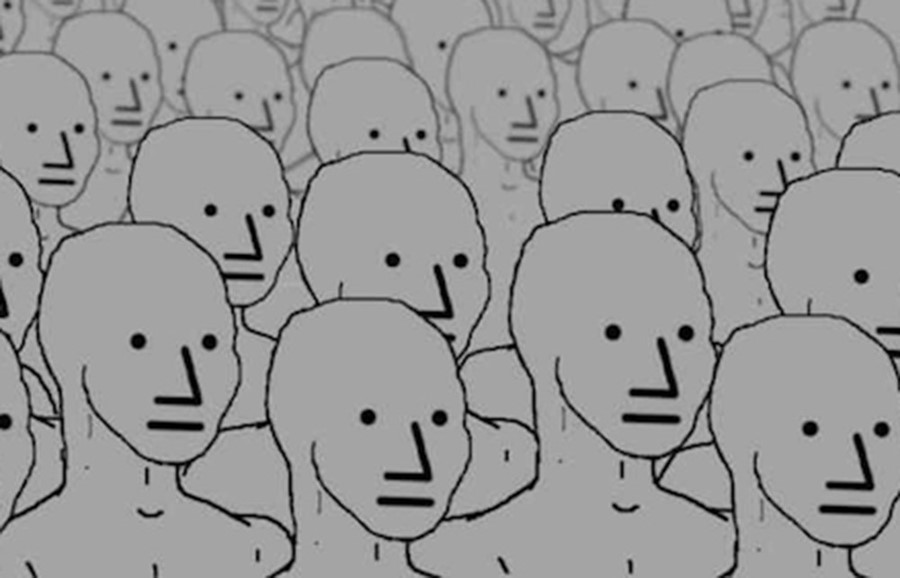From right-wing slur to viral TikTok trend, people are pretending to be non-playable characters on social media – adding weight to the theory that life is just one big simulation
It’s a sunny day in Venice. A girl stands in a gondola and stares vacantly into the camera. “Would you like to take a ride with me?” she asks, waving her arms in the air. With 40 million views, there’s an uncanny quality to the video, titled “First Date with NPC” (an acronym for a “non-playable character” in a video game). The girl’s glossy eyes and deadpan expression make you wonder, is she real? Is she a simulation? In the words of one commenter: “I don’t know what to believe.”
“Today’s machines look increasingly like humans; it’s strange that this line between machine and human is starting to blur,” says Nicki and Loczek, the creator duo behind the viral video. Inspired by the robotic movements of non-playable characters in video games, the pair are behind the growing NPC trend on TikTok (the hashtag #npc currently has over two billion views). Other videos on the pair’s account include Nicki, a professional dancer, running up against invisible barriers as if to evoke the boundaries of a map and moving her body in a soulless manner to imitate the scripted gestures of an avatar. The result is strange, almost unnerving, akin to swallowing the red pill and waking up in a simulation.
More recently, a new wave of NPC streamers has appeared on Tiktok, with viewers paying users – the most famous being @pinkydollreal and @cherrycrush_TV – for awards during livestreams, which translate into money for the creator. The surreal videos often involve nothing but the creator staring into the camera, their head bobbing and repeating the same series of uncanny gestures, with each award tied to an action or phrase.
Feeling my brain reconfigure after I watch this for the 30th time pic.twitter.com/5vxOy2MRa5
— @goth (@goth600) July 13, 2023
It’s no surprise that the NPC trend has gained traction post-pandemic, as the increasing digitisation of our lives seems to have led to increased attention on The Simulation Hypothesis, a 2003 theory posed by philosopher Nick Bostrom that suggests we exist in a Matrix-style computer simulation. Many NPC TikToks include the hashtag #simulation or #simulationtheory, with commenters usually reflecting on their own existential doubts. “I exist and I don't feel real” comments one user on Nicki and Loczek’s video. Last year, the theory was also backed by Elon Musk, who believes there’s a 99.9 per cent chance that the universe we inhabit is a computer simulation. Recent film releases like Free Guy and Matrix 4 – both of which came out in 2021 – only add to this speculation.
“With today’s current events a lot of people are warming up to the idea of us being in a simulation. These videos tend to play on the idea that normal everyday people may not be real after all,” agrees @realhorrortok, who posts videos of everyday people doing weird things like walking in circles and staring at nothing which, he believes, resembles the behaviour of NPCs. Other accounts go a step further, using the NPC trend as an excuse to film and harass “weird” people in the street (don’t do this).
The term NPC originally gained traction in 2018 with the arrival of NPC Wojak, a crudely drawn rendition of the original Wojak (AKA the Feels Guy meme) with a pointy nose and blank stare. Emerging from the swamps of Reddit and 4chan, the term was used as a slur to describe people who do not think for themselves, but was quickly adopted by right-wingers in a mass-trolling campaign directed at ‘snowflake’ liberals. The idea was that the left had been brainwashed by woke culture, responding to Donald Trump’s legislation with buzzwords that resemble scripted characters in a video game. Ignoring the massive reduction of leftist rhetoric – NPC Wojak has since evolved in meaning – its message of sheeple conformism, or general state of unthinking, remains the same (see: I support the current thing meme).
The NPC trend on TikTok feels removed from its Wojak roots, instead focusing more on the simulated feel of reality. 93 per cent of under-18s admit to gaming regularly, while VR social platforms like VRChat are booming in popularity. It also arrives at a time when society seems to be shedding its narcissistic obsession with Main Character Syndrome, segueing into a more understated existence. ‘Side character energy’ is a growing trend on TikTok to describe people who want to take life less seriously and not feel the pressure to live in the spotlight. Likewise, NPCs feed into our post-ironic sensibility, where it’s better to joke about being an unthinking automaton than accept that our lives are beginning to feel increasingly unreal. Chances are we won’t be able to afford basic energy bills this winter, Rishi Sunak or Liz Truss will replace Boris as PM, and Mark Zuckerberg is threatening to drag us into a dull metaverse populated by sexless avatars. Like NPCs, we don’t know what’s real and what’s not (do we want to know?), so the only thing left to do is lean back and laugh at the absurdity of it all.
@goodymyofficial How many gamers can relate? #gaming #gamers #npc #funny #humor #games #comedy #skit ♬ original sound - goodymyofficial




